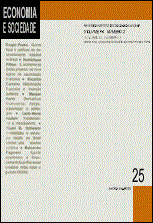Resumen
Este artigo contrasta o conhecido conceito de senhoriagem com o de soberania, o qual relaciona a capacidade de o Estado emitir moeda denominada na unidade por ele escolhida, sem qualquer garantia explícita de conversibilidade, a um poder fundamental diretamente associado a nações soberanas. Qualquer Estado soberano com capacidade de impor tributos estará apto a emitir moeda fiduciária, a definir exogenamente a taxa de juros básica e a financiar seus gastos na aquisição de bens e serviços mediante a criação de reservas bancárias, não sendo necessário que o Estado se endivide antes de gastar. Muitas nações optaram por não exercer esse poder soberano, escolhendo em contrapartida fixar as taxas de câmbio, emitir dívida público denominada em moedas estrangeiras, ou adotar o regime de currency board. Este artigo mostrará que isso é um equívoco e argumentará que a abordagem da soberania oferece instrumentos mais adequados à compreensão da operação de sistemas monetários modernos do que a noção de senhoriagem
Abstract
This paper contrasts the well known concept of seigniorage with sovereignty. The sovereignty approach links the State’s ability to issue a currency denominated in the unit of account it has chosen, without any explicit guarantee that the currency will be converted to anything, to a fundamental power that is directly associated with sovereign nations. Any sovereign State that has the ability to impose tax liabilities will be able to issue a fiat money, to exogenously maintain overnight interest rates, and to deficit spend, purchasing goods and services by crediting bank reserves. It will never need to borrow before it can spend. Many nations have chosen not to exercise this sovereign power, choosing instead to fix exchange rates, to issue government debt denominated in a foreign currency, or to operate with a currency board. This paper will show why this is a mistake, and will argue that the sovereignty approach offers insights into operation of modern money systems that the notion of seigniorage cannot provide.
Key words: Money. Sovereignty. Seigniorage. State money. Floating exchange rate system
Citas
BELL, Stephanie. Do taxes and bonds finance government spending? Journal of Economic Issues, v. 34, n. 3, p. 603-620, 2000.
BLACK, S. Seigniorage. In EATWELL, John, MILGATE, Murray, NEWMAN, Peter (Ed.). The new Palgrave: money. New York/London: WW Norton, 1989.
GOODHART, Charles A. E. Money, information and uncertainty. Cambridge, Mass: MIT Press, 1989.
________. Two concepts of money: implications for the analysis of optimal currency areas. European Journal of Political Economy, v. 14, p. 407-432, 1998.
KNAPP, Georg Friedrich (1924). The state theory of money. Clifton: Augustus M. Kelley, 1973.
MEHRLING, Perry. Modern money: Fiat or credit? Journal of Post Keynesian Economics, Spring, v. 22, n. 3, p. 397-406, 2000.
MOSLER, Warren. Full employment and price stability. Journal of Post Keynesian Economics, Winter, v. 20, n. 2, p. 167-182, 1997-98.
PIÉGAY, Pierre, ROCHON, Louis-Philippe (Ed.). Theories monetaires post keynesiennes. Paris: Economica, 2003.
ROSSI, Sergio. Review of Understanding modern money. Kyklos, p. 483-485, 2001.
WRAY, L. Randall. Understanding modern money: the key to full employment and price stability. Cheltenham: Edward Elgar, 1998.
A Economia e Sociedade utiliza a licença do Creative Commons (CC), preservando assim, a integridade dos artigos em ambiente de acesso aberto.

